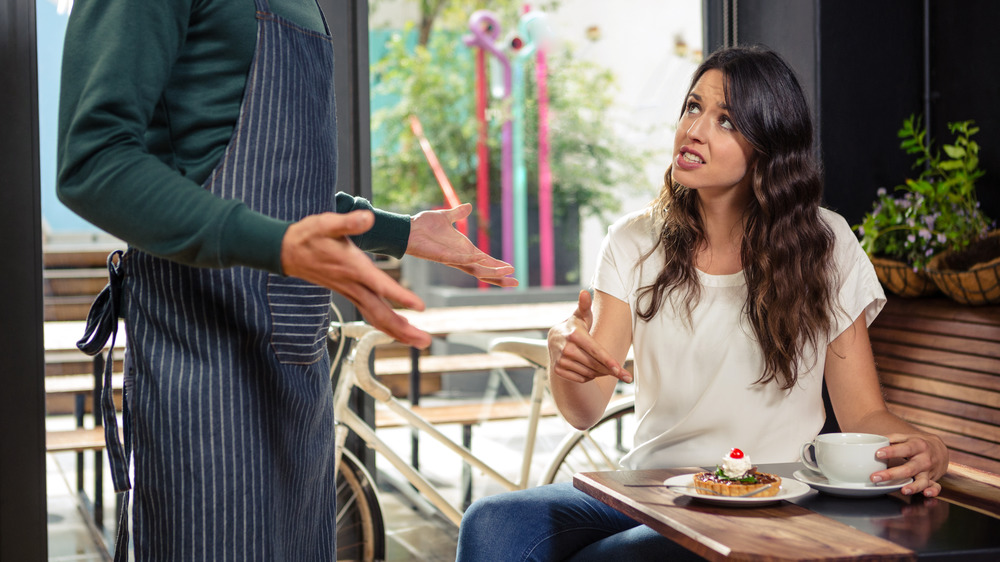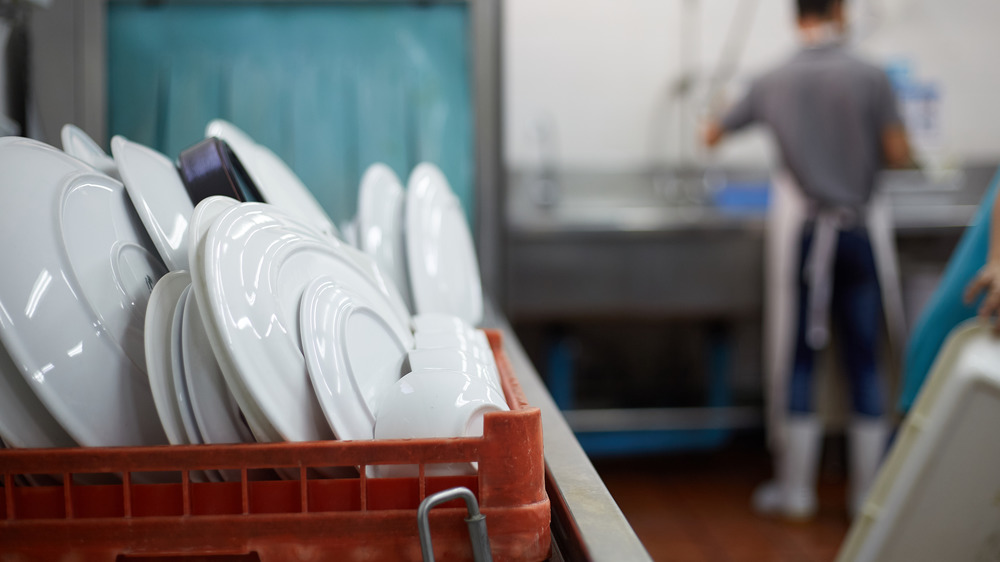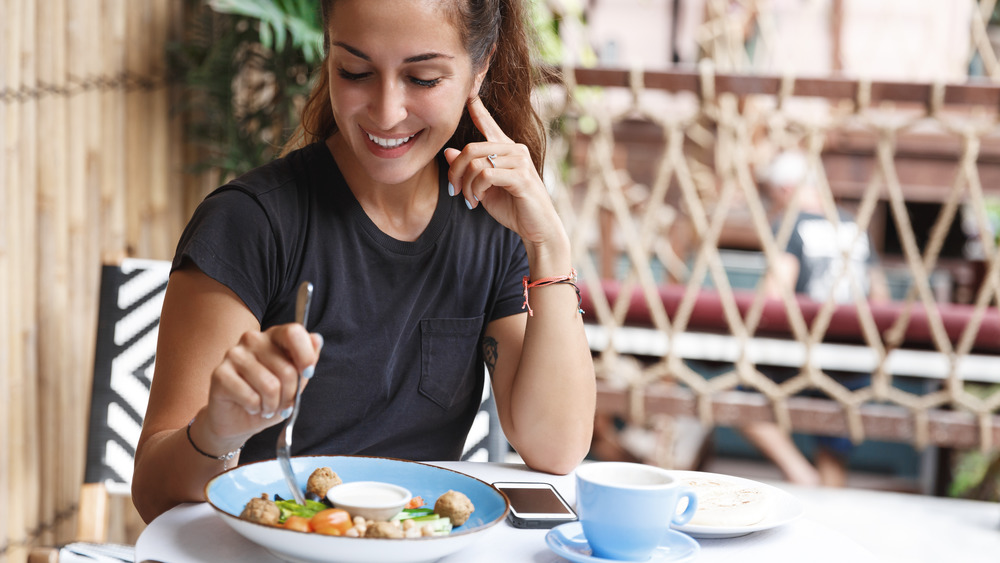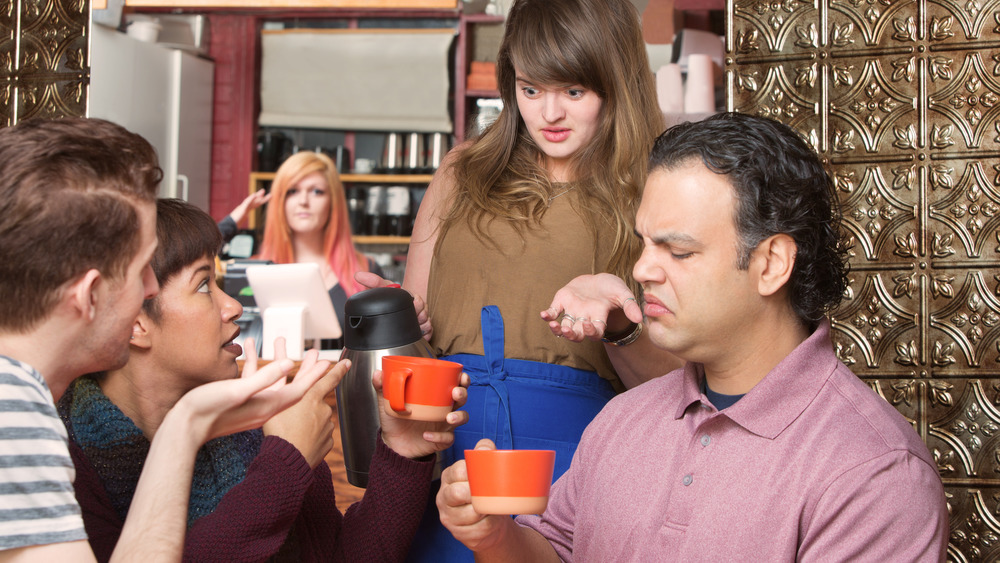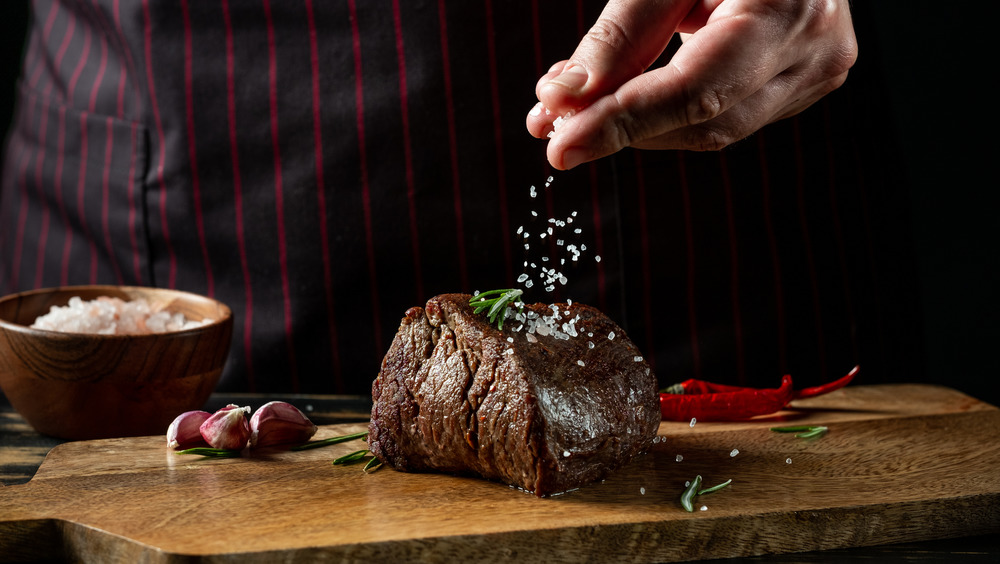7 Times You Should And 5 Times You Shouldn't Send Your Food Back
Let's be honest: Working in the service industry can be the pits. Not only does restaurant staff have to deal with a litany of obnoxious, entitled customers, they've also got to deal with tables that don't tip despite the fact that it's taken them every ounce of human will to swallow their dignity and smile at someone shoving an allegedly dry piece of chicken breast in their face and screaming like a lunatic (we can only speak from personal experience here). Nonetheless, beyond the customer always being right, there are times where the customer actually is right. Who would've thought?
Every diner has encountered a moment where they felt like they had to send their food back — but whether or not they should has been hotly debated. In fact, a 2018 YouGov study found that 15 percent of millennials won't send their food back for any reason, but there are certain situations where it's totally justified. If you've sent your meal back to the kitchen with a list of complaints, don't chop your hair into a "can I speak to the manager" haircut and take out a new credit card under the name Karen just yet. Here are seven times you can send your meal back without the threat of feeling shame every time you return (and five times you absolutely shouldn't).
Should: You're given food you didn't order
According to YouGov's survey, 85 percent of adults in the U.S. said they would send back food if they were given the wrong meal. Obviously, there's a consensus here. If the server brought you something completely different than what you ordered, you shouldn't have to pay for it. Nor should you be forced to eat a hamburger when you actually ordered a healthy salad (or, in the reverse, be forced to choke down some Brussels sprouts when you wanted the comfort of junk food).
In most cases, the mistake isn't so egregious. For example, maybe you ordered sweet potato fries, but the waiter forgot to make the substitution or didn't hear you properly over the chatter of other customers. It's understandable, but it's still the restaurant's mistake. Send back the side, but the key is to always be kind. Servers aren't robots, and if they were, you wouldn't be able to complain to them about messing up your order. Does the menu screen in McDonald's listen when you scold it? It couldn't care less. In this case, just kindly let the server know about the error. According to a former dishwasher on Reddit, sometimes restaurant workers even eat orders that are sent back because of a mistake. It happens.
Should: You're allergic to your food
Nobody should have to feel bad about sending back a meal because they're trying not to die. Allergies are so serious that Thrillist lists it as the number two reason to send back food. Yes, even if you forgot to ask for the offending ingredient to be substituted. Sometimes, not every ingredient is even listed on the menu. For example, the milk you didn't know was in those scrambled eggs can inadvertently cause a very bad post-brunch for the lactose intolerant.
Of course, there are a small minority of people who may knowingly consume just a little bite of crab cake despite their shellfish allergy. Maybe they don't mind enduring an entire meal with itchy lips and/or a Benadryl high. If you're one of those people and purposely order something you're allergic to, don't be a Karen. In this case, the customer is wrong. Share it with your table, but don't send it back — and please, for the love of all the EpiPens in the world, stop eating stuff your body is clearly rejecting.
Should: Your food is undercooked or burnt
There is no such thing as rare chicken, and nobody — seriously, nobody — should be eating undercooked poultry unless they want to have a very bad time. According to Insider, it can put you at risk for life-threatening bacteria like campylobacter and salmonella, but there's actually a whole bunch of foods you should never eat raw. For this reason, YouGov found that a whopping 82 percent of adults in the U.S. would send back undercooked food, but just 43 pervent of them would send back something that's overcooked.
Nonetheless, unless you're in the small minority of people who like your food extra crispy, it's still okay to send back food that's burnt — not charred when it's supposed to be charred, but burnt. Per one server on Reddit, who claims to have several years of restaurant experience, the chef will make your meal again if it was cooked incorrectly the first time around.
Unfortunately, sometimes the idea of "cooked incorrectly" is in the eye of the beholder. In this case, it's still okay to inquire. The server will clear it up for you. "Sometimes it's the customer's misunderstanding of the preparation standards for the food," Tanya Holland, the chef and owner of Bay Area restaurant Brown Sugar Kitchen, told Eater. "A lot of people think chicken that's been brined and is really moist inside [is still raw] and we have to explain it's cooked to the proper temperature, for instance."
Should: Your food is too cold or too warm
Nobody wants to eat cold soup, unless that soup is gazpacho. Sending back food because it's the wrong temperature isn't exactly a crime against humanity, and this has been a problem for decades (or, more realistically, since the invention of the modern restaurant). All the way back in 1993, The New York Times published a report called "If the Soup Is Cold, Speak Up, Already," which should have put the topic to rest. The general consensus among the restaurateurs interviewed was to send the food back — but only before you've eaten it.
"It's like that moment in a wedding ceremony when there is one last chance to object: If no one speaks up, you're married," wrote journalist William L. Hamilton. "When your food arrives, if you don't say no, you've said yes, for richer or poorer."
Nonetheless, YouGov's 2018 survey found that only 48 percent of people would send back an order because it's too warm or too cold. That means a whole lot of folks out there are probably chowing down on accidentally room temperature eggs, which possess a sliminess not easily forgiven. Don't complain later on Yelp if you failed to speak up.
Should: Your food has a foreign object in it
If you find a foreign object in your meal, the restaurant could have a bigger problem on their hands than simply eating the cost of the meal you refused to eat. They could face a potential lawsuit if the object led to injury, which is why it's not uncommon to see companies recall food from grocery store shelves.
In this case, something like an eggshell probably isn't going to cause intestinal harm, but no one would blame you for sending your meal back. Think about it: According to The Los Angeles Times, the Queen Mother was hospitalized for four days in 1982 because she had to have a fish bone surgically removed from her throat. Accidents do happen, but that's some liability. Beyond that, YouGov found that 81 percent of people would send food back because there was a hair in it. A single hair isn't even a choking hazard, but the thought of pulling a long black strand out of your macaroni and cheese is very unsettling.
If you do complain, just make sure you actually mean it. Most of us know about the woman who infamously faked the discovery of a severed finger in her Wendy's chili. According to CBS News, she was sentenced to nine years in jail, and her husband, who somehow procured the finger, landed more than 12 years.
Should: Your food isn't what's described on the menu
Before you send food back to the kitchen, you should think about who's actually at fault. Did the restaurant mess up, or did you order wrong? If it's the restaurant's mistake, that's usually the green light to speak to your server. A prime example is if your meal isn't anything like it's described on the menu. As one Quora chef revealed, there's no problem sending things back if they're not as advertised, particularly if you can't stand the taste.
"Sending a dish back because it is not something you expected is only part of the story," Chef Marc DeGiovanni wrote. "Why didn't you expect something? Have you had this style of cooking before? Have you eaten this very dish at this establishment and it tasted completely different? If the dish tastes absolutely terrible ... then it is not rude to send a dish back."
Again, manners are key. Micah Paloff, director of operations at Alice at the 1 Hotel West Hollywood, told USA Today that as long as the complaint is "done in a respectful manner, and not offensive, guests should feel comfortable asking for a dish to be remade." In other words: If your penne alla vodka is meant to have pancetta but the pancetta is mysteriously absent, send it back.
Should: Your plate or glass is dirty
It's no secret that people have different standards for hygiene. Some people will roll the dice on a hot dog that's been incubating under a 7-Eleven heat lamp for an immeasurable amount of time. Other people are far more conservative and won't eat at any establishment that doesn't have an A rating from the Department of Health.
Regardless of where you fall on the spectrum, there are some things that make you question a restaurant's hygiene, however unfair that assessment may be. In truth, there are few things more unsettling than picking up your cocktail and finding someone else's lipstick firmly planted on the rim. It feels like that kiss from a distant aunt you desperately wanted to avoid, and to some diners, that single offense is so horrific they might as well be live-action roleplaying the next installment of Saw – but let's not play any games. If your plate or glass is dirty, send your dish back. According to YouGov's study, 80 percent of people agree.
Shouldn't: You've already eaten most of your food
Maybe you were simply blinded by hunger pangs and needed the dust (or the belly full of food) to settle before realizing your meal wasn't exactly what you ordered. Maybe you needed a full stomach to help you work up the courage to confront your server. Maybe you're just a jerk (in which case, you should probably look inward). Either way, restaurant staff will not be pleased if you eat the majority of your meal before sending it back.
According to OpenTable's chief dining officer, Caroline Potter, complaints should be voiced early on. "It's a bit impolite to consume the majority of a dish and then relay negative feedback," she told USA Today. Why? The staff don't have a chance to fix the problem. The restaurant can't solve an issue if they don't know it exists until you're paying the check (and hopefully, not taking out your frustration on the wait staff).
Shouldn't: You don't have a reason why you don't like your food
Believe it or not, it's actually okay to send back a dish that you didn't like even if there's nothing technically wrong with it. In fact, some chefs love to see people jump out of their comfort zone and try something new even though they might not like it. "Sending back a plate because the client ordered blue cheese-encrusted lamb with truffled potatoes, and the customer has never eaten anything potent or gamey in his or her life, is a learning experience that I would even support allowing the customer to take home to try at their leisure, free of charge," Chef Marc DeGiovanni told Quora.
The real problem comes when a customer sends back a dish they didn't like without any particular reason. As chef Tanya Holland told Eater, "If I'm in the kitchen, I want to know what the issue is. When I'm not [at the restaurant], people might email me directly and say, 'Hey, the shrimp tonight wasn't like you make it,' and that gives me an opportunity to investigate what the kitchen is doing differently."
So, if your food is too salty, say it's too salty. If your meal is so unbelievably fowl to your taste buds that you'd rather eat dirt, maybe remind yourself to be kind before you speak up. Just don't expect for your meal to comped if you don't give a reason.
Shouldn't: You think the coffee is 'too old'
No one particularly likes the idea of drinking an aging cup of coffee that's been sitting on a burner in a gas station convenience store for 12 hours — but rest assured, your restaurant coffee probably isn't that, and you're probably going to annoy your server if you insist on them making a fresh pot. In fact, one anonymous server on Reddit owned up to secretly giving a table decaf after they complained about the coffee being too old. He assured them it was fresh, and they paid the price of remaining uncaffeinated.
That server isn't alone in his frustration, though. From the looks of it, this is a very common way to bother restaurant staff. In the same thread, someone else owned up to serving decaf to obnoxious customers. Another lamented about the common practice of returning coffee that's allegedly "too cold" even though it came right off the pot. Another flatly admitted, "If you send back coffee because it's 'cold,' I'm topping off your pot and bringing it straight back. I only serve hot/fresh coffee. Don't try to tell me it is cold."
In short: Don't insult a restaurant by claiming they're serving you old coffee. Coffee can be too hot, you know. Just look at what happened at McDonald's.
Shouldn't: You ordered a medium steak but didn't want any pink in the middle
There is no topic more hotly debated in the restaurant industry than how you should take your steak, and some would say that if you don't want to get laughed out of a nice steakhouse, you should probably never utter the word "medium." Want to cause a scandal? Seductively whisper medium-well. Even Guy Fieri, a dude who serves something called "trash can nachos," thinks you should cook your steak medium-rare (that steak may just be marinated in a Bloody Mary, though).
Even if you're one of the scorned people who prefer their steak very done, you still need to order it properly or you relinquish the right to send it back to the kitchen without some side-eye. "We know that you think that ordering a steak med-well may get you mocked by the staff ... and seems low-brow and unsophisticated," admits one Redditor, who says they work at a fine dining steakhouse, "But if you don't want pink, you want med-well or [well done], just admit it! If I only had a dollar for every medium steak that's been sent back, bumped up, sent back out at med-well only to be praised as, 'Perfect! just the way I wanted it!'"
If you're not sure how you want your steak, ask the server. It's better to be upfront rather than waste an expensive cut of meat or ruin the kitchen's flow with a return.
Shouldn't: You ordered food but had no idea what it was
When you're ordering food in a restaurant, you do need to take some level of responsibility if you don't want to annoy your server. Like stated above, it's okay to dislike your meal. What's not okay is if you order something on the menu without knowing what it is, then send it back because it's not what you wanted.
The mistake is understandable: Not everyone dining at a French restaurant for the first time understands French menu items. Menus are filled with different ingredients from different cultures in different languages, but that's why we ask questions. In an era of smartphones, Google is right at your fingertips — or you could always do the courageous thing and ask your server. Their job is to help.
As chef Marc DeGiovanni told Quora, "Thought Turbot was a cut of beef and not a type of fish, and you really wanted a steak with that scotch on the rocks? Then you are rude if you send the dish back." Similarly, don't purposely order something you dislike then try to send it back. Maybe you remembered you hate basil and ordered pesto, but that was your choice. Be responsible.






